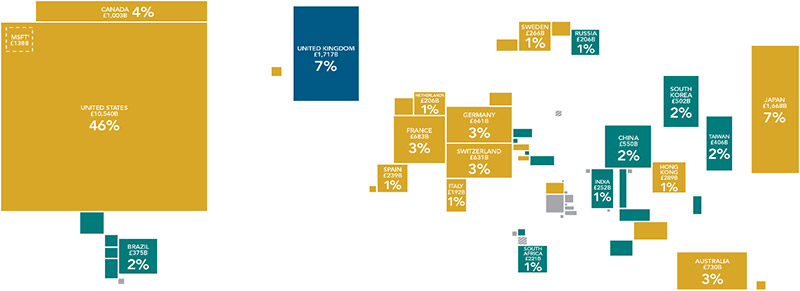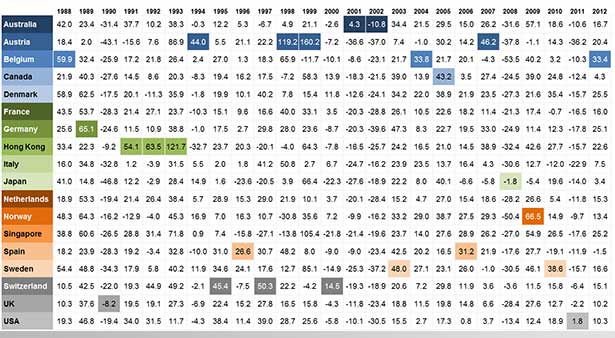How to choose the right investment for your goals
When it comes to choosing an investment, statistics show a strong bias toward domestic stocks. More specifically, both individual and institutional investors tend to show preference toward the local equity market when constructing their portfolio.
The term “putting all your eggs in one basket” comes to mind. Investors could significantly reduce their risk exposure if they held a portion of their asset portfolio in foreign stocks.
In addition to this, there is the risk that the domestic market underperforms resulting in below par investment performance. Academics have proposed a number of reasons for this bias to become prevalent, but no matter the origins, failure to diversify abroad places the investment portfolio at risk of heavy drawdowns through limited diversification from local market risks.
Home bias and international diversification: Where exactly should you place your money?
Studies have shown that, over the long-term, equity markets tend to outperform many other asset classes and, although the investor must tolerate an elevated level of risk, equities remain a core component of both private and institutional investor portfolios.
The investment decision with regard to share choice is an entire industry within itself. However, one aspect which most astute investors will be aware of is diversification. The major benefit of diversification is that it reduces portfolio risk by decreasing exposure to any single element. In addition to this, research has shown that there are significant added benefits to international diversification.
Failure to diversify across international markets is often referred to as “home” or “domestic” bias. Many investors fall victim to this bias because of the ease of access to information regarding local firms, their own inexperience and anxiety with regards to offshore investment and the potential tax or cost implications which may arise. Many of these biases and concerns may be unwarranted, and they conceal the reality that investing solely within domestic equities presents a significant opportunity cost.
The chart below depicts the world by the size of each country’s stock market relative to the world’s total market value. While the US is by far the largest market, it is interesting to note the wide dispersion following that. China, Japan, Germany, France and the UK, which make up the next five biggest economies (as measured by GDP and according to the World Bank), make up a combined share of just 22% of market caps.
The implications here are significant as the domestic investor in developed financial centres such as South Africa, or even Spain and India, are exposed to just a fraction of the global equity market, heightening local market risk, while limiting exposure to offshore gains.

Figure 1: World market capitalisation (£23.1 trillion as at 31 December 2012)
With this knowledge in hand, the prudent investor may make an effort to diversify across international markets. However, the question remains as to where exactly they should place their money. The chart below shows annual equity returns of developed markets. Interestingly, the US outperforms its peers on just one occasion. Thus, market size is perhaps not the best indicator of where to invest.

Figure 2: Equity returns of developed markets (annual return, GBP %)
It is clear from the data that there are significant benefits to investing outside of your domestic market, but as it is near impossible to determine which market will deliver optimal returns, it makes sense to diversify across as many countries as possible. This will expose your investment to the largest and most developed capital markets, while elevating your risk-adjusted return.
This is easier said than done. Opening your portfolio to international markets may seem like a daunting prospect. However, this need not be the case. Sable International's investment portfolios are, by construction, heavily diversified across global financial markets. Furthermore, given the nature of the funds in which they have been invested, costs have been kept to a minimum. As a result, by moving your portfolio over to us, you will enjoy all the benefits of an internationally diversified portfolio at a cost likely to be lower than a domestically invested fund.
Make offshore investing part of your long-term financial plan.
The use of trusts
We understand that there is no one-trust solution for all, and each individual situation must be examined on a case-by-case basis. That’s why we take the time to research and understand your long-term investment objectives and take into consideration the current and future tax situation, before advising you on the most relevant and cost-effective trust structure for your goals.
Trusts, perhaps incorrectly, have a reputation as predominantly playing a part within the tax and financial planning process through the ability to settle property out of estate. While this remains a core functional benefit of a trust, it is by no means exhaustive. Increasingly, trust structures have the ability to offer a number of unique and interesting roles within the overall financial plan and can assist in overall wealth creation.
The legal structure of a trust means that they are independent entities, separate from both those providing the funds (the settlor), those who are the intended beneficiaries as well as the entity that manages the investment (the trustee). As a result of this, the tax treatment can offer significant individual and family benefit, but can also become incredibly complicated. This why it’s important to seek advice from a reputable financial services firm that is able to meet your individual needs and provide you with good advice.
Investing from abroad
We have well-established relationships with a number of providers who are able to service clients investing from abroad and understand the concerns related to this type of investment, and we are well positioned for such a proposition.
It’s important to understand that investing solely within your home country heightens the concentration risk on the portfolio, as your assets will be exposed to a single market. This phenomenon is commonly referred to as “home bias”, and it is crucial that you attempt to diversify your portfolio not only across sectors, but across geographical regions.
However, this is easier said than done, as there are a number of important factors which must be taken into account including tax declarations, capital restrictions and, ultimately, the investment structure.
Given the nature of our client base, we have a wealth of experience within this space as well as the ability to service every aspect of the process. This includes the facilitation of capital migration from one country to another, the establishment of tax wrappers as well as ongoing investment advice and management. In addition, our investment platform offers both UK mainland and offshore (Jersey) account options for non-resident investors.

